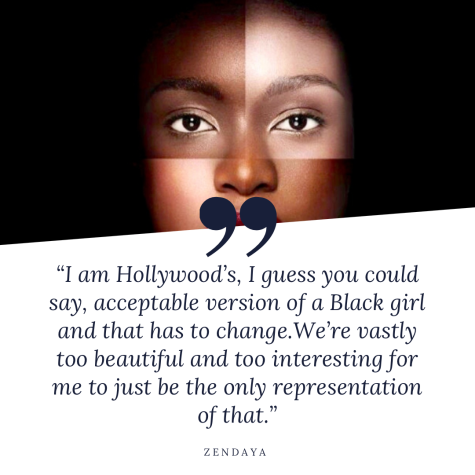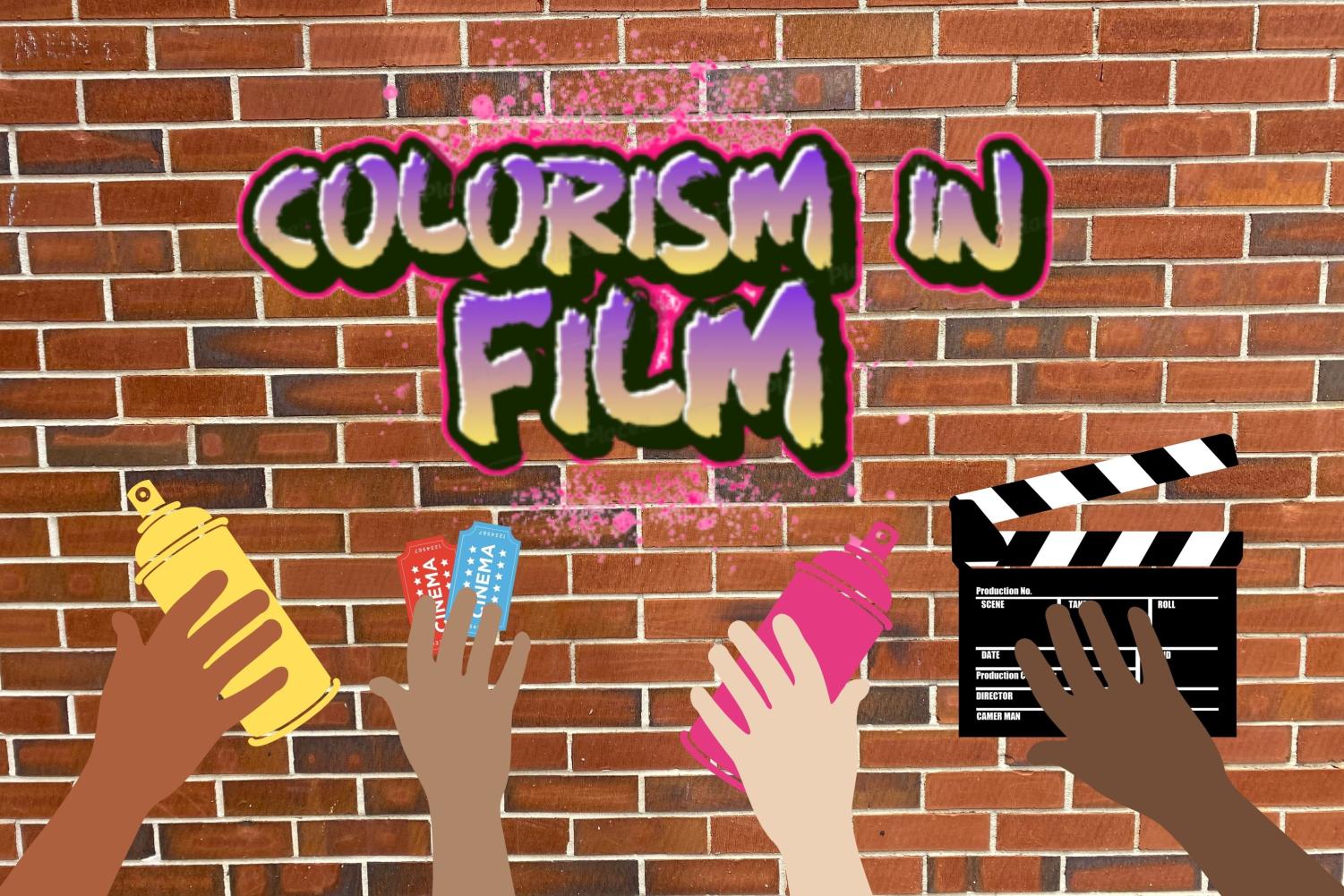Your donation will support the student journalists of North Cobb High School. Your contribution will allow us to purchase equipment and cover our annual website hosting costs.
Hollywood’s hatred of hues
April 18, 2022
Colorism, defined as a form of racism within the black community, displays itself in a multitude of ways. The subconscious preference for lighter-skinned black people continues to cause damage within black populations, as several believe that their light-skinned peers will thrive because the world sees them as “prettier” and “sophisticated”. Colorism roots in slavery when slave masters treated fair-skinned individuals better than the darker skinned. Unfortunately, black people have adopted this unintentional bias, which significantly manifests itself in the film industry.
“I think colorism manifests itself in film and television similarly to how it has traditionally presented itself in the thinking of a large part of our culture. Light-skinned people are considered prettier, smarter and less threatening than darker-skinned people, so that goes into casting. If a character is supposed to be the beauty queen or the pretty girl, they will cast a lighter actress and if someone is supposed to be a thug or menacing figure, they will cast a darker actor. Diversity, to me, means other than white. It means black people in all of our beautiful hues,” screenwriter Elyse Strong Mann said.
The lack of black actors and actresses noticeably shows throughout Hollywood’s history. Producers favored lighter-skinned actors for significant roles when they cast black individuals, while roles for darker-skinned people tend to reinforce or amplify racist stereotypes. These preconceptions tend to exhibit themselves in children’s films, which feeds this concept into these young and impressionable minds. For example, in the well-known Disney Channel show “Jessie”, producers cast actress Skai Jackson as a little black girl from Africa with a big personality and a sassy attitude. This plays into colorism because Jackson happens to possess a darker skin complexion and type 4 hair, as well as her character, fits the stereotype of a generic black girl. Additionally, actress Trinitee Stokes’ role in the Disney Channel show “KC Undercover” fit the role of a typical black girl similar to Jackson’s character. On the other hand, Stokes’ lighter-skinned sister on the show, played by Zendaya, portrayed an articulate, sensible character. This places both lighter and darker-skinned men and women in a position where they feel as if they cannot simply express themselves and their blackness without preconceived notions, thus resulting in a multitude of identity crises.
“The most prominent black actress I’ve seen growing up is Zendaya. I think it affects young black girls more than we may realize because most of the time, when you grow up without seeing anyone with the same skin tone as you on TV, it almost puts the idea that women of darker skin tones don’t get to play those kinds of roles or you just have that idea that things like that are only for lighter women and they don’t cast people that look like me”, NC freshman Tamara Manuel said.
Furthermore, Hollywood casts lighter-skinned actors for significant roles meant for individuals with darker hues. They tend to use the same mixed-race appearing actors such as Zendaya rather than finding people actually fit for the role. Not only do these film productions misrepresent darker skin tones, but this puts forth a misleading image of the character. Angie Thomas’ notable novel “The Hate U Give” described the main character, Starr Carter as a brown skin teenage girl living in a black neighborhood. However, audiences nationwide were in for a surprise when Amandla Stenburg, a distinguished fair-skinned actress, played the role of Carter in the movie. When films cast melanated actors, Hollywood typically recycles the same ones for films entailing characters. For example, people began seeing actress Lupita Nyongo on magazine covers and starring in films known as the “beautiful dark skin actress”, shortly after she debuted in the award-winning film “Black Panther” in 2018. Although actors and actresses such as Stenburg prove themselves extremely talented, misconstrued images like this will likely cause detrimental effects on the black community’s self-image, given the fact that they do not see Hollywood stars who look like them.
“For me generally, I feel like I always come up with my own visions of what that person may look like, so I’m not sure if it’s my own belief that the person should’ve been lighter or should’ve been darker. Once I see it, I like to hope that the actress was good for the part and that was the reason that they got the part as opposed to their looks. I feel like I expose my children to enough things to understand that all shades are beautiful. Some people may think lighter shades are best, but all shades are beautiful. That’s my narrative, I will always say all shades are beautiful,” NC counselor Leza Aldridge said.
Fortunately, actresses like Zendaya recognize their light-skin privilege in film and advocate for the casting of darker actors and actresses. She stated in an interview that she’s Hollywood’s “acceptable version of a black girl”. She also previously turned down roles with respect to the potential for darker shades of actors. This reassures the black community because it indicates her awareness of the issue and her efforts to reform it.

“I feel a responsibility to be a voice for the beautiful shades my people come in. Unfortunately, I have a bit of a privilege compared to my darker sisters and brothers… Like people question, Would you listen to Zendaya if she wasn’t the same skin color? And that’s an honest question. Can I honestly say that I’ve had to face the same racism and struggles as a woman with darker skin? No, I cannot. I have not walked in her shoes and that is unfair of me to say. But I’m completely behind that woman. I want to be a part of the movement and growth. And if I get put in a position because of the color of my skin where people will listen to me, then I should use that privilege the right way,” Zendaya said.
Media companies seem aware of the lack of variety and inherent colorism in the industry but continue to reinforce stereotypes in order to boost earnings and gain approval from a predominantly white audience. Recognizing that most people possess an unconscious preference for white/lighter skinned black people, the media makes a conscious effort to appeal to white people, fearing that they won’t be able to reach as wide an audience if they do not.
“When there was a biopic on Nina Simone, they cast Zoe Saldana to play Nina Simone. They had to put a prosthetic nose and darker makeup on Zoe. There was a lot of backlash at the time and I never saw the movie. I thought it was disrespectful to who Nina was and her journey. I have no problem with actresses like Zendaya being cast to play a black woman because they are black women, but we must see more people who see the beauty and intelligence in all of us to be the producers and decision-makers to make a change. Additionally, we need to stop perpetuating our own self-hate and see our own beauty,” Mann said.
Only 1.4 out of ten major performers in films were people of color, according to UCLA’s Hollywood Diversity Report from 2018. Several recently criticized The Golden Globe for announcing the 2021 nominations for best actors and actresses, with three out of ten finalists being Black. To worsen the matter, they put Black performers in the “Urban” category for Grammy award nominations. This emphasizes the disproportionate representation of the black community in the arts as a whole.
The casting of light-skinned persons in films over dark-skinned people not only defines itself as colorism but also a clear form of racism that must be addressed and eradicated. While any black person who achieves success in Hollywood counts as a win for the black community, whether light-skinned, dark-skinned or anywhere in between, Hollywood will not achieve true diversity until women with darker skin are appropriately represented.
“I’m light-skinned, and I’ve seen myself represented over and over again, sometimes even inserted in roles that weren’t meant for people who look like me. Other Black children deserve the same representation that I’ve gotten, they deserve to see people who look like them, too”, student activist Naveah Kelley said.
